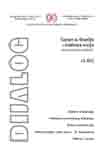Husserlova fenomenološka epistemologija
Husserl’s Phenomenological Epistemology
Author(s): Tom RockmoreSubject(s): Philosophy, Phenomenology
Published by: Akademija Nauka i Umjetnosti Bosne i Hercegovine
Keywords: phenomenology; psychologism; transcendental idealism; epistemology
Summary/Abstract: Like Hegel’s, Husserl’s phenomenological epistemology can be assessed in relation to Kantian epistemology. Husserl depends on Kant in a number of ways: for example, his concern with philosophy as a rigorous science, his conception of phenomenology as transcendental idealism, the relation of transcendental phenomenology to the life-world, and, above all, the problem of psychologism. This problem, which arises in Kant’s criticism of Lockean so-called physiology, leads to a conception of the subject as a later version of the Kantian transcendental unity of apperception running throughout Husserl’s position from beginning to end. It further shapes his view of phenomenology as epistemology. Through his response to the problem of psychologism, which Husserl constantly tries to overcome, his position is in constant dialogue with Kant’s critical philosophy, to which he comes increasingly closer through the evolution of his position from descriptive phenomenology to transcendental idealism. I emphasize the development of Husserl’s position as a continuing effort to resolve difficulties, particularly as concerns psychologism, arising in his effort to work out a phenomenological approach to knowledge.
Journal: Dijalog - Časopis za filozofiju i društvenu teoriju
- Issue Year: 2012
- Issue No: 01+02
- Page Range: 7-49
- Page Count: 43
- Language: Bosnian

